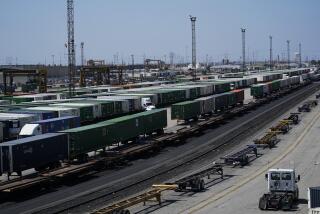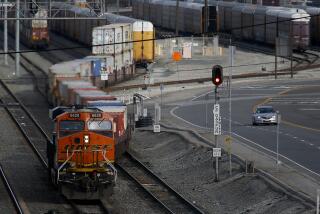Clean-Air Challenge to Get Day in Court
WASHINGTON -- A drive in the Los Angeles area to replace old diesel-burning buses, trash trucks, street sweepers and airport shuttles with cleaner-burning vehicles will be tested this fall in the Supreme Court.
The justices agreed Monday to hear an industry challenge to the “fleet rules” adopted three years ago by the South Coast Air Quality Management District.
The Engine Manufacturers Assn. and the Western States Petroleum Assn. contend that the federal Clean Air Act bars local regulators from setting their own standards for engines.
The 1970 law “expressly preempts any state or local standards for emissions,” said Chicago lawyer Phil Neal, who represents the engine makers.
Environmental advocates in Los Angeles say they are not forcing manufacturers to change their engines, but simply asking municipal officials to buy the cleanest-burning buses and trucks available.
“This case is about the self-interest of dirty-engine manufacturers,” said Gail Ruderman Feuer, a lawyer for the Natural Resources Defense Council. “We are fully confident the [U.S.] 9th Circuit’s decision [approving the air quality district’s rules] will be upheld by the Supreme Court,” she said.
The rules, adopted by the air quality district in 2000, do not govern private trucks. They regulate the purchase of a fleet of 15 or more vehicles by cities, county agencies, school districts and other government units in Los Angeles, Orange, Riverside and San Bernardino counties.
District regulators said they were spurred to act by a study which concluded that diesel exhaust was responsible for 71% of the risk of cancer from airborne materials in the Los Angeles area.
The rules require government managers to purchase, when possible, buses or trucks that use clean-burning alternative fuels, such as natural gas.
Officials have estimated that it would take four to 10 years for the agency fleets to turn over as diesel trucks and buses are replaced by newer vehicles.
The higher cost would fall on the local agencies, and although none of them sued, the makers of truck and bus engines sued to block the rules from taking effect.
However, U.S. District Judge Florence-Marie Cooper said the rules for new purchases do not conflict with the Clean Air Act.
“The fleet rules require purchasers to choose from among a subset of previously certified California vehicles,” she said. This “does not compel manufacturers to meet a new emissions limit,” she concluded.
The U.S. 9th Circuit Court of Appeals affirmed her ruling in a two-sentence decision.
Meanwhile, American Trucking Assns. and the Alliance of Automobile Manufacturers joined the original challengers in urging the high court to intervene.
In defense of the rules, lawyers for the air quality district said they are acting to further “the core purpose of the Clean Air Act, which is to reduce air pollution.”
But after considering the appeal for several weeks, the high court issued a one-line order Monday saying the justices have agreed to hear the case, Engine Manufacturers Assn. vs. the South Coast Air Quality Management District.
Oral arguments are set for the fall.







